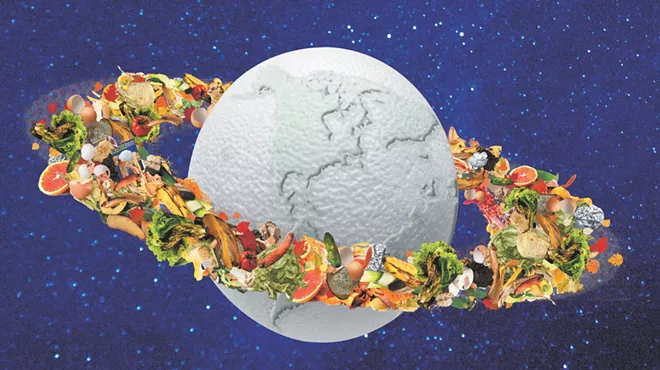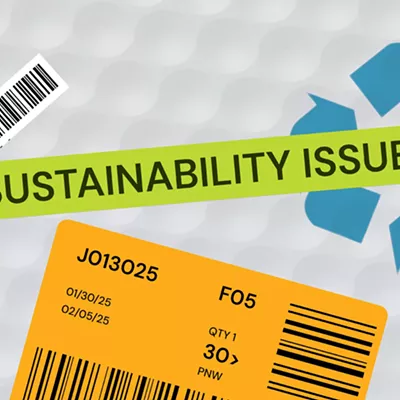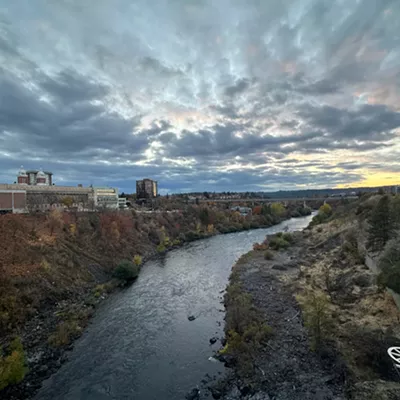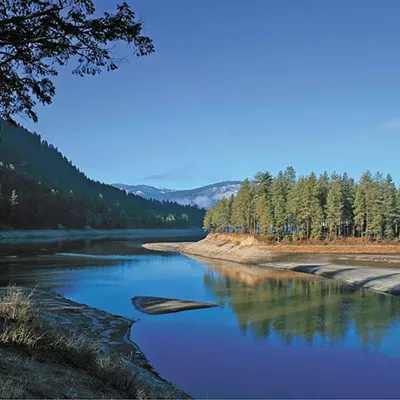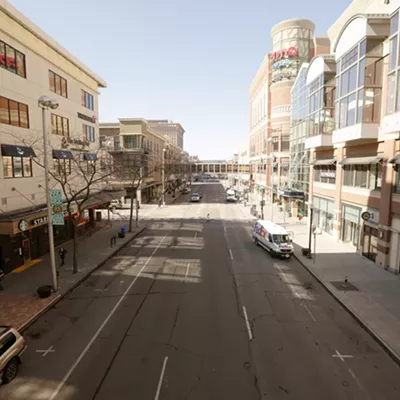
Do you know what's in the back of your fridge? How about the corners of your pantry? How many times do you take advantage of a great BOGO deal, only to forget about the bag of spinach liquefying in the guts of your produce drawer?
Unfortunately, Spokane County leads the state for the amount of food thrown away each year — about 170 pounds per person, according to a Washington state Department of Ecology study. About a third of all waste in Spokane could have been composted instead of thrown in the garbage.
In 2015, the Environmental Protection Agency and U.S. Department of Agriculture created a national goal to cut food loss and waste in half by 2030. Four years later, Washington lawmakers passed the "Use Food Well Washington" plan, with similar goals.
The plan also created the Center for Sustainable Food Management within the Department of Ecology.
The state "food center" opened in January, with plenty of input from Kris Major, the waste reduction education coordinator for the city of Spokane, and Second Harvest, an Eastern Washington-based food distribution charity.
"In a lot of ways, our Spokane partnerships have helped create the center," says Jade Monroe, lead planner for the new hub.
The center will focus on three tactics: prevent food from being thrown away in the first place, rescue food at risk of being wasted, and recover the energy from organic material that needs to be discarded. If Washington achieves its goal, these tactics will help keep about 200,000 tons of edible food out of landfills each year.
Over 53,000 people in Spokane County have trouble putting enough food on the table.
Food in landfills is a waste in multiple ways.
First, it's bad economics. Throwing spoiled groceries away is as good as throwing dollar bills in the trash. The EPA says that about a third of food produced in the U.S. is never eaten — all the money and energy used to grow that food ends up rotting.
That rot turns into an environmental risk, since food decaying in landfills produces methane, a dangerous greenhouse gas. The EPA says that wasted food in the U.S. produces the same amount of greenhouse gases as 50 million gas-powered cars.
And then there's the social concern. Almost 13% of U.S. households experienced food insecurity in 2022, according to the USDA. Feeding America says that over 53,000 people in Spokane County have trouble putting enough food on the table. In 2019, when 66.2 million tons of wasted food was rotting in landfills, millions of Americans were going hungry.
"It's teaching people that the garbage is [usually] not the best choice," Major says. "First, how can you think about ways that you purchase food and cook food and save it when you have leftovers so that you're making less waste that goes in the trash? And then if you do have leftover food, what other options do you have?"

BUY ONE, (DON'T) GET ONE
Walking down a grocery aisle, customers are usually barraged with advertisements to buy this, buy that, buy more. But what if there were signs encouraging you to buy more thoughtfully?One of the state food center's first initiatives is an education campaign based in grocery stores — because the best way to reduce food waste is to not create it in the first place.
"Safeway is going to have food waste reduction education at the point where people engage with food throughout their stores," Monroe says. "We're finding that it's the best way to communicate and hopefully promote action."
So, next to a lucrative buy-one-get-one deal, you might also see a sign that asks, "Do you know how to cook that, or how to store it properly? Will you use that food well, or will you end up tossing it at the end of the week?"
Getting something at a discount doesn't save money if you end up throwing it away, says Emily Menshew, a nutrition education associate at Second Harvest, which helps stock food banks around the region. Menshew runs classes every Monday about how to get the most bang for your grocery buck, which mostly includes not throwing food away. Simple planning and cooking techniques can help your bottom line and also protect the environment.
Meanwhile, the Center for Sustainable Food Management is launching its statewide campaign during international Food Waste Prevention Week from April 1-7.
"Anyone can sign up to be a partner," Monroe says of the education campaign. "It's a big national effort. It'd be fun to see a really strong Spokane presence this year."
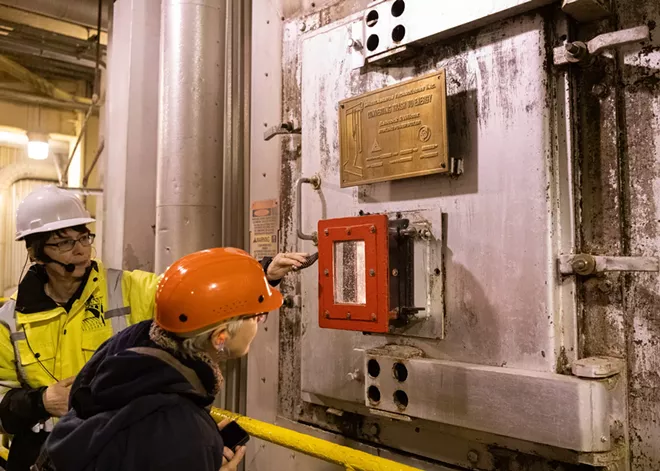
SLOW BURN OR SOIL INSTEAD
No matter what, some food scraps — banana peels, coffee grounds, eggshells — need to be discarded.In 2019, 40 million tons of U.S. food waste ended up in landfills, while about 3.3 million tons were composted.
This might not seem like a big deal in Spokane, which burns most of its trash and turns it into electricity at the regional Waste to Energy plant. But food waste isn't easily converted into energy by burning — it's too wet, Spokane waste educator Major says, and it slows the burning process for everything else around it.
"It's really a resource that needs to go back into the soil where it belongs," she says.
In addition to brown trash cans and blue recycling bins, the city offers green bins for leaves and grass clippings, as well as for produce scraps, meat and dairy scraps, and food-soiled paper like pizza boxes and egg cartons.
From March to November each year, the city will pick up these green bins for an extra $20 a month and deliver it to Barr-Tech Composting, a commercial composting facility 30 miles west of Spokane.
"The city is looking at adjusting our rates so that the savings from downsizing from one size of trash can to the other would pay for the subscription to a green cart," Major says.
Thanks to the mild winter, the city started its green bin curbside collection a little early this year on Feb. 26.
Once the organic material is delivered to Barr-Tech, it's ground down and mixed into piles that have the proper amount of water, carbon, nitrogen, oxygen and heat. These perfect conditions essentially eliminate the production of methane gas and feed the proper microbes that eat the organic matter and turn it into usable topsoil. Barr-Tech then sells that topsoil to landscaping companies, mine reclamation projects and construction sites.
Any new home in Spokane probably has composted topsoil on its new lawn, says Scott Deatherage, a manager at Barr-Tech. The company has sent soil to Silver Valley's Superfund cleanup efforts, and will supply the Washington State Department of Transportation with fertile, healthy soil to beautify the North Spokane Corridor, also known as the north-south freeway.
"The benefits of compost are far beyond waste management," Deatherage says. "The purpose of doing this is to build healthy soil."
An organics management law passed by Washington in 2022 is already tightening regulations on the disposal of organic material. Currently, any business generating at least 8 cubic yards of organic waste each week must compost it. In two years, any business generating 4 cubic yards — two typical dumpsters — of any kind of waste each week must arrange to compost its organic waste.
Mandating residential compost is trickier, Major says, because of the time and effort it takes to sort garbage.
The EPA says that wasted food in the U.S. produces the same amount of greenhouse gases as 50 million gas-powered cars.
Deatherage worries that mandating residential composting would increase the amount of contamination in organic waste so much that he might not be able to do his job.
Plus, Spokane only collects green bins nine months of the year. In the winter when there's not enough yard waste to fill the bins, which are over 30 gallons, it's not cost effective to collect them, Major says.
The city does, however, offer a free Master Composter and Recycling class every year that teaches residents how to compost in their own backyard or basement. Composting at home means managing food waste, cutting down on garbage and increasing soil health for free.
"If someone has a dwelling, they can compost for virtually no dollars at all," says Tera Lessard, the new course lead for the Master Composters class. "I think our biggest barrier that we need to overcome as a community is education. [Even] a really simple internet search is gonna tell you what you can and can't put into a pile and how to protect it from rodents, wildlife, or any kind of smell."
Lessard is a longtime volunteer for Master Composters and is taking over the class from Major, who's retiring on March 8. She'll no longer be part of the formal waste management system in Spokane, but Major's work to combat food waste will continue through the partnerships with the state's new sustainability center.
"It's a big problem," Major says. "We all need to be thinking about ways that we can help." ♦
GREEN BINS
Spokane's clean green bin collection started on Feb. 26. Green carts can take more than yard waste — throw in kitchen scraps from meat, dairy, breads and veggies, plus food-soiled papers like pizza boxes and paper grocery bags. Don't throw in any shiny paper products, plastics or glass. Need a green cart? Sign up by calling 3-1-1. Pick up times are the same as your weekly garbage collection, and the current fee is $20.72 a month.




